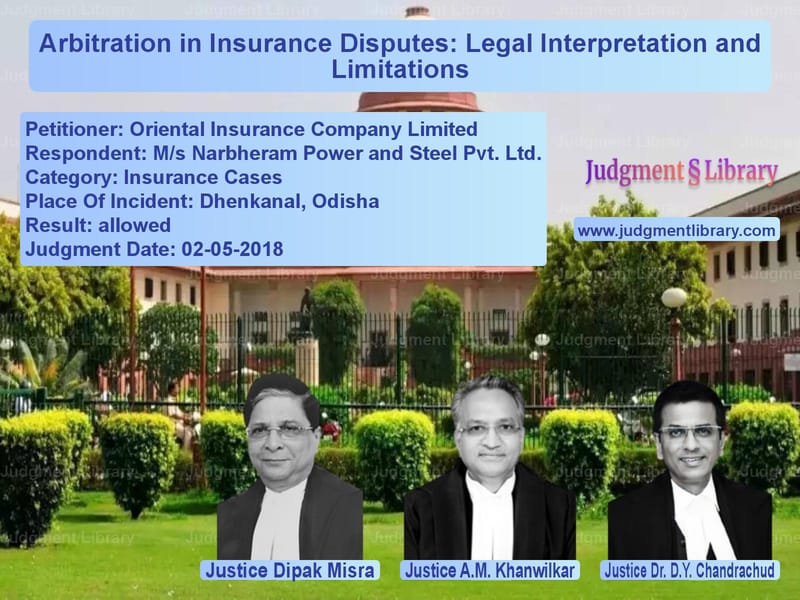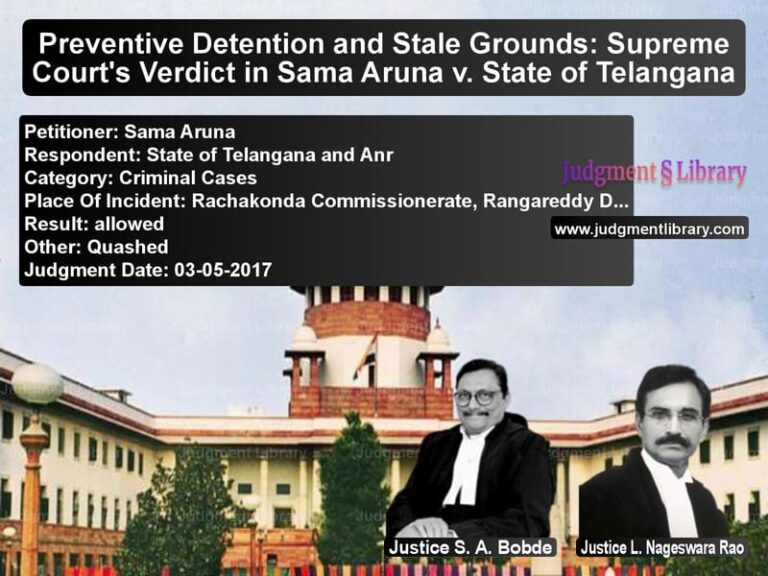Arbitration in Insurance Disputes: Legal Interpretation and Limitations
The legal battle between Oriental Insurance Company Limited and M/s Narbheram Power and Steel Pvt. Ltd. highlights critical issues regarding insurance claims, arbitration clauses, and contractual obligations. The case arose after Cyclone Phailin struck Odisha in 2013, causing significant damage to the respondent’s factory. Despite having a valid insurance policy, the insurer repudiated the claim, leading to a dispute over the validity of the arbitration clause.
The Supreme Court was tasked with determining whether the dispute should be referred to arbitration under Clause 13 of the insurance policy. The judgment emphasized that if an insurer explicitly denies liability, arbitration is not applicable, and the appropriate recourse is a civil suit. This ruling underscores the principle that contractual terms govern arbitration and that courts cannot introduce arbitration where it has been expressly excluded by agreement.
Background of the Case
M/s Narbheram Power and Steel Pvt. Ltd. had taken a Fire Industrial All Risk Policy from Oriental Insurance Company Limited for their factory in Dhenkanal, Odisha. The policy covered various risks, including damage due to natural calamities. In October 2013, Cyclone Phailin caused extensive damage, prompting the respondent to claim Rs. 3,93,36,224 under the policy.
The insurer appointed a surveyor, Ashok Chopra & Company, which inspected the premises and conducted an assessment. After a series of correspondences, the insurer ultimately rejected the claim, stating that it did not fall under the scope of coverage. The respondent then invoked the arbitration clause in the policy, seeking the appointment of an arbitrator. However, the insurer refused arbitration, arguing that it had denied liability entirely, thereby making arbitration inapplicable.
Legal Issues Raised
The primary legal question before the Supreme Court was whether the arbitration clause in the insurance policy could be invoked when the insurer had outrightly denied liability. Clause 13 of the policy contained a provision stating:
“If any dispute or difference shall arise as to the quantum to be paid under this policy (liability being otherwise admitted) such difference shall independently of all questions be referred to the decision of a sole arbitrator.”
The clause further clarified that:
“It is clearly agreed and understood that no difference or dispute shall be referable to arbitration if the company has disputed or not accepted liability under or in respect of this policy.”
Arguments by the Parties
Arguments by the Petitioner (Oriental Insurance Company Limited)
- The insurer argued that since it had explicitly denied liability, Clause 13 of the policy prevented the dispute from being referred to arbitration.
- The repudiation of the claim was based on specific grounds, including inventory shortage, lack of actual stock loss, and exaggerated damages.
- They cited precedents such as General Assurance Society Ltd. v. Chandumull Jain, which held that courts must interpret contracts strictly and cannot introduce terms not agreed upon by the parties.
- They contended that the High Court had erroneously interpreted the clause by suggesting that it suffered from ambiguity.
Arguments by the Respondent (M/s Narbheram Power and Steel Pvt. Ltd.)
- The respondent maintained that the rejection of the claim was not a complete denial of liability but a dispute over the quantum of damages.
- They relied on The Vulcan Insurance Co. Ltd v. Maharaj Singh, which held that arbitration clauses should be read broadly to include disputes over liability and quantum.
- The respondent argued that denying arbitration would render the arbitration clause meaningless, as insurers could simply repudiate claims to avoid arbitration.
Supreme Court’s Analysis
The Supreme Court extensively examined Clause 13 of the policy and past judicial precedents. The Court concluded that when an insurer outrightly denies liability, arbitration cannot be invoked. The ruling reaffirmed that:
- An arbitration clause must be strictly interpreted according to the contract’s wording.
- If a contract explicitly states that arbitration is not applicable in cases where liability is denied, courts cannot override this agreement.
- Arbitration can only be invoked when liability is admitted but the quantum of damages is disputed.
The Court relied on precedents such as The Vulcan Insurance Co. Ltd., which upheld the principle that a complete denial of liability removes the matter from arbitration.
Key Judicial Observations
The Court made several important observations:
“The parties are bound by the terms and conditions agreed under the policy and the arbitration clause contained in it.”
“The communication ascribes reasons for not accepting the claim at all. It is nothing else but denial of liability by the insurer in toto.”
“The only remedy which the respondent can take recourse to is to institute a civil suit for mitigation of the grievances.”
Final Verdict
The Supreme Court allowed the appeal, overturning the High Court’s decision to appoint an arbitrator. The respondent was directed to file a civil suit if they sought redress. Additionally, the Court granted the respondent the benefit of Section 14 of the Limitation Act, 1963, allowing them to file a suit within two months.
Implications of the Judgment
This ruling has significant implications for insurance disputes:
- It reinforces the principle that arbitration is a matter of contract, and courts cannot rewrite contractual terms.
- Insurers can validly refuse arbitration if they completely deny liability.
- Policyholders must seek legal recourse through civil suits when liability is denied.
- The judgment serves as a precedent for interpreting arbitration clauses in commercial contracts.
In conclusion, this case reiterates the importance of contractual clarity in arbitration clauses. Policyholders and insurers must be mindful of their rights and obligations when entering into insurance contracts, as judicial interpretation will strictly adhere to the agreed terms.
Petitioner Name: Oriental Insurance Company Limited.Respondent Name: M/s Narbheram Power and Steel Pvt. Ltd..Judgment By: Justice Dipak Misra, Justice A.M. Khanwilkar, Justice Dr. D.Y. Chandrachud.Place Of Incident: Dhenkanal, Odisha.Judgment Date: 02-05-2018.
Don’t miss out on the full details! Download the complete judgment in PDF format below and gain valuable insights instantly!
Download Judgment: Oriental Insurance C vs Ms Narbheram Power Supreme Court of India Judgment Dated 02-05-2018.pdf
Direct Downlaod Judgment: Direct downlaod this Judgment
See all petitions in Commercial Insurance Disputes
See all petitions in Insurance Settlements
See all petitions in Other Insurance Cases
See all petitions in Judgment by Dipak Misra
See all petitions in Judgment by A M Khanwilkar
See all petitions in Judgment by Dhananjaya Y Chandrachud
See all petitions in allowed
See all petitions in supreme court of India judgments May 2018
See all petitions in 2018 judgments
See all posts in Insurance Cases Category
See all allowed petitions in Insurance Cases Category
See all Dismissed petitions in Insurance Cases Category
See all partially allowed petitions in Insurance Cases Category







